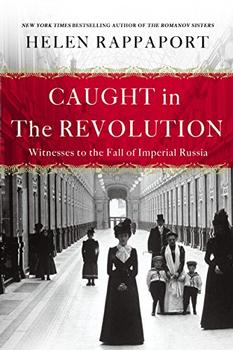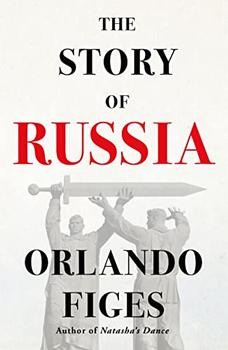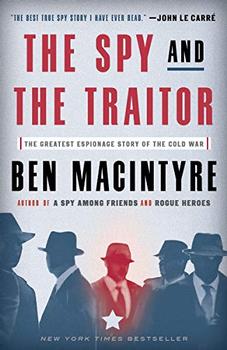Summary | Excerpt | Reviews | Beyond the book | Read-Alikes | Genres & Themes | Author Bio

Petrograd, Russia, 1917 - A World on the Edge
by Helen RappaportFrom the bestselling author of The Romanov Sisters, Caught in the Revolution is Helen Rappaport's masterful telling of the outbreak of the Russian Revolution through eye-witness accounts left by foreign nationals who saw the drama unfold.
Between the first revolution in February 1917 and Lenin's Bolshevik coup in October, Petrograd (the former St Petersburg) was in turmoil – felt nowhere more keenly than on the fashionable Nevsky Prospekt. There, the foreign visitors who filled hotels, clubs, bars and embassies were acutely aware of the chaos breaking out on their doorsteps and beneath their windows.
Among this disparate group were journalists, diplomats, businessmen, bankers, governesses, volunteer nurses and expatriate socialites. Many kept diaries and wrote letters home: from an English nurse who had already survived the sinking of the Titanic; to the black valet of the US Ambassador, far from his native Deep South; to suffragette leader Emmeline Pankhurst, who had come to Petrograd to inspect the indomitable Women's Death Battalion led by Maria Bochkareva.
Helen Rappaport draws upon this rich trove of material, much of it previously unpublished, to carry us right up to the action – to see, feel and hear the Revolution as it happened to an assortment of individuals who suddenly felt themselves trapped in a "red madhouse."
Helen Rappaport sorts out the chaos and establishes vivid and memorable images of each of the players "caught in the Revolution." Her non-fiction narrative has nothing in common with dry textbooks that most readers of this review might remember. The book reads more like popular and compelling fiction. More people would love the study of history if writers had Rappaport's skills that make this book such an engaging but thoroughly documented read...continued
Full Review
(754 words)
This review is available to non-members for a limited time. For full access,
become a member today.
(Reviewed by First Impressions Reviewers).
The subtitle of Caught in the Revolution is Petrograd, Russia, 1917 - A World on the Edge. Petrograd is more familiar to most today as St. Petersburg, a city that saw its name change three times in the 20th century.
It was founded in 1703 during the reign of Peter the Great for geopolitical reasons: he was looking for a way to keep invading armies from Sweden at bay and a strategic defense point close to the north, that provided easy access to the Baltic Sea for trading reasons, seemed like a good option. To counter the Swedes, he commissioned the Peter and Paul Fortress that would form the anchor of the rapidly growing city. Eager to have a city that was modeled after the great European ones, and swayed by Dutch-German influence, the ...
This "beyond the book" feature is available to non-members for a limited time. Join today for full access.

If you liked Caught in the Revolution, try these:

by Orlando Figes
Published 2023
From "the great storyteller of Russian history" (Financial Times), a brilliant account of the national mythologies and imperial ideologies that have shaped Russia's past and politics - essential reading for understanding the country today.

by Ben Macintyre
Published 2019
The celebrated author of Double Cross and Rogue Heroes returns with his greatest spy story yet, a thrilling Americans-era tale of Oleg Gordievsky, the Russian whose secret work helped hasten the end of the Cold War.